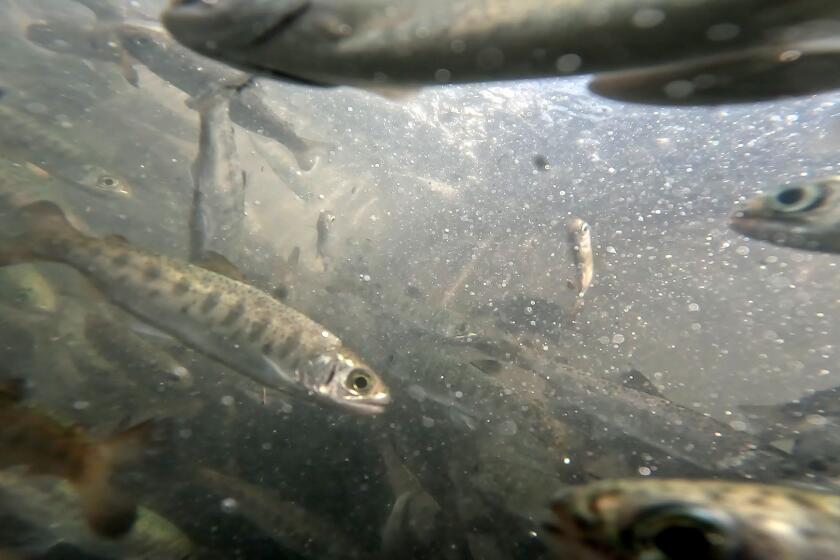The Last Roundup : Castaic: The cattle business is a labor of love for the Cordova family, who have gotten together to tally and brand their herd since 1784.
Taking inventory on the Cordova Ranch is different from any other business in Los Angeles County.
Instead of pencil and paper, the Cordovas use horses and lariats to tally their stock.
Livestock, that is.
Every spring since 1784, the Cordovas and their friends have fanned out on horseback over the hills of Castaic to round up their cattle before sending some of them to market.
The fact that Castaic now has more housing tracts and 18-wheel trucks than heifers did not make much difference Sunday, when ranch hands conducted the Cordovas’ 208th annual roundup.
The last traditional cattle roundup in Los Angeles County is still an old-fashioned affair, complete with branding irons heated in a wood fire until they are red-hot, and beef barbecued overnight in a three-foot-deep pit.
“This is more than a hobby, it’s a tradition for us,” said Donna Cheseborough, whose family owns the 100-acre ranch.
The Cordovas and other cattle ranchers are a vanishing breed in Los Angeles County, which was once known as the “Queen of the Cow Counties” but now is home to fewer than 5,000 beef cattle, said Jim Sullins, livestock and range adviser for the University of California. Most of those cattle are raised by Newhall Land & Farming Co., and Tejon Ranch, neither of which holds a traditional roundup, company spokesmen said.
The Cordovas used to own more than 1,040 acres in Castaic, 10 times as much as they do now. In 1967, the state took most of the land for the Castaic Reservoir. The clan got more than $1 million for the property, according to the state Department of Water Resources. But the family, who homesteaded the land 208 years ago, would much rather have kept the ranch, relatives said.
“There’s a lot of memories buried under that water,” said Rudy Cordova, 64, gazing out from the remaining land overlooking the reservoir.
The Cordovas did manage to salvage some things from the old ranch, including the outhouse, which still provides the only toilet facilities on the smaller spread.
Every day, brothers Rudy and Lawrence Cordova, who are in their 60s, drive eight miles from downtown Castaic to the ranch to care for their 350 head of cattle. A cross between Polled Herefords and Black Angus, the cattle graze on 1,500 acres, including land that the family rents from neighbors.
Some of that grazing land is destined to be used for a 3,000-unit housing tract, and when that happens “we’ll just have to stop,” Rudy said with regret.
This year, the Cordova roundup was staffed by about 20 old hands and a few novices, all of whom are volunteers. There was Steve Perron, a Northridge carpenter, who said he felt like he was in the movie “City Slickers,” which traces the adventures of three urbanites during a cattle roundup. “I was the new guy who didn’t know what he was doing,” Perron said.
Beginning last Friday, Perron and the other cowboys and cowgirls helped gather the cattle, herding them into a holding pen. They drove the bawling cattle Sunday into a corral by snapping leather whips overhead and shouting. The babies were then branded on the right hip with the L-C brand, which stands for Lawrence Cordova, and the young males castrated.
Meanwhile, “wet cows,” or the ones nursing calves, were herded into an orange metal contraption called a “squeeze chute” which held them while cowboys cleaned grubs out of their ears.
About 50 steers were taken to market in a cattle truck.
The business is a labor of love, not a profit-making venture, said Nancy Cordova, one of Lawrence’s two daughters. Last year, the family broke even between the cost of hay and the sale price of the beef.
The youngest hand on the roundup was Morgan Cromer, 8, of Acton, who spent three days on her horse “Cookies and Cream” helping gather cattle. A competent horsewoman since she was 2 years old, Morgan first participated in the Cordova roundup when she was 6, Perron said. That’s not all that unusual. The Cordova grandchildren have also been helping out since they were youngsters. Cheseborough, who has three sons, hopes they will take over the business someday, if development does not eat up all the land first.
“I tell my sons, ‘This is where you came from,’ ” she said. “ ‘You gotta take time and smell the cow manure.’ ”
More to Read
Start your day right
Sign up for Essential California for news, features and recommendations from the L.A. Times and beyond in your inbox six days a week.
You may occasionally receive promotional content from the Los Angeles Times.






